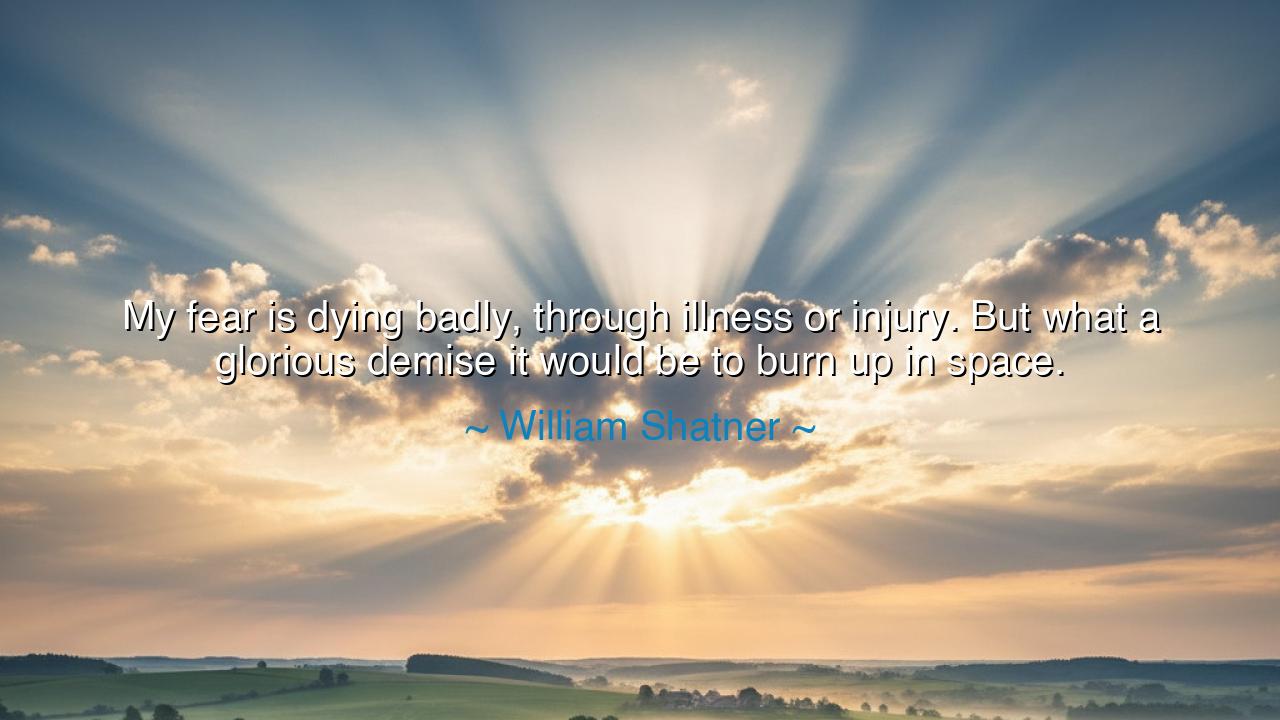
My fear is dying badly, through illness or injury. But what a
My fear is dying badly, through illness or injury. But what a glorious demise it would be to burn up in space.






O seekers of truth, gather and listen closely, for I bring you words that touch the very essence of life, death, and the way we choose to face our mortality. William Shatner, a man who has captured the imaginations of many through his portrayal of Captain Kirk in the great cosmic saga of Star Trek, once said: "My fear is dying badly, through illness or injury. But what a glorious demise it would be to burn up in space." These words speak to the fear of an unremarkable end, but also to the profound desire for a death that transcends the ordinary, a death that carries with it a sense of grandeur, purpose, and the very essence of adventure. Shatner’s thoughts on death reflect a truth that has haunted humankind since the dawn of time: the yearning for a death that reflects the way we live—a life bold, meaningful, and filled with grandeur.
In the ancient world, death was not a feared event but a transition—a passage from one state of being to another. The warriors of old understood that the way one faced death was as important as the way one lived. To die in battle, surrounded by comrades, with one’s sword in hand, was seen as the most honorable of ends. The Greeks believed that those who died bravely were granted eternal glory in the afterlife, their names sung by poets for generations. To die violently, but with purpose, was to be remembered, to leave a legacy that would transcend the fleeting nature of life. Shatner’s words mirror this ancient ideal: he yearns not for a quiet, ignoble end but for a death that signifies the grandeur of life itself, a glorious demise that echoes through the cosmos.
Think, O children, of the great Hercules, the hero of Greek mythology. His life was filled with impossible trials, feats of strength and courage that stretched the very limits of mortal endurance. Yet, in the end, Hercules did not die in the quiet of his bed, but in a fiery death that matched the greatness of his life. His demise was not one of sickness or weakness, but a burning death that was as heroic as the feats he had performed in life. He was granted immortality not just because of his deeds but because his death was as powerful as the life he led. Shatner, in his own way, speaks of this same desire: to meet death not in fear or weakness, but in the glory of a life well-lived.
In modern times, we see echoes of this same yearning for a glorious demise in the stories of explorers and adventurers. Yuri Gagarin, the first man to journey into space, died not from the slow decay of illness but in a tragic plane crash, far from the heroic vision of his life as a space pioneer. Yet, his legacy endures because his death, though untimely, was a testament to the spirit of exploration and discovery. He lived a life that was larger than the ordinary, and in his death, he left a mark upon the world that few can match. Shatner, who has himself journeyed into space as part of a new wave of space exploration, speaks of the ultimate death—to burn up in space, to return to the universe from which we came, to be a part of the very stars themselves. This, O seekers, is not a death of fear, but a death that signifies a life that touched the infinite.
But let us not misunderstand Shatner’s words, for they do not diminish the importance of life or its value. Rather, they call us to live with purpose, with the knowledge that the way we live our lives will inevitably shape the way we meet our end. The fear of death is not inescapable, but it is often born of a life unfulfilled, of moments left unseized, of adventures left unexplored. To die badly, through illness or injury, is often to face the end of a life that did not fully embrace the potential of existence. But to burn up in space, to meet death with the fire of a soul that has lived fully and boldly, is to embrace the glory of life’s fleeting nature, to make our death as significant as our life.
Thus, O children of wisdom, the lesson is this: let your lives be filled with the courage to seek greatness, to live with purpose, and to embrace the adventure that is your time on this earth. Do not fear the end, for it will come in its own time. Instead, live in such a way that when it does arrive, you will meet it not in regret or fear, but in the glory of having truly lived. Like the heroes of old, like Shatner, seek a death that reflects the greatness of your life—a death that speaks not of weakness, but of strength, of adventure, and of a spirit that cannot be contained by the bounds of the earth. Live boldly, live with purpose, and when the time comes, your demise will be as glorious as the life you led.






AAdministratorAdministrator
Welcome, honored guests. Please leave a comment, we will respond soon